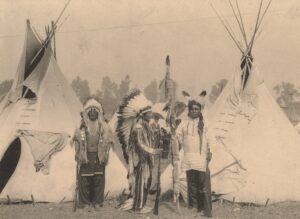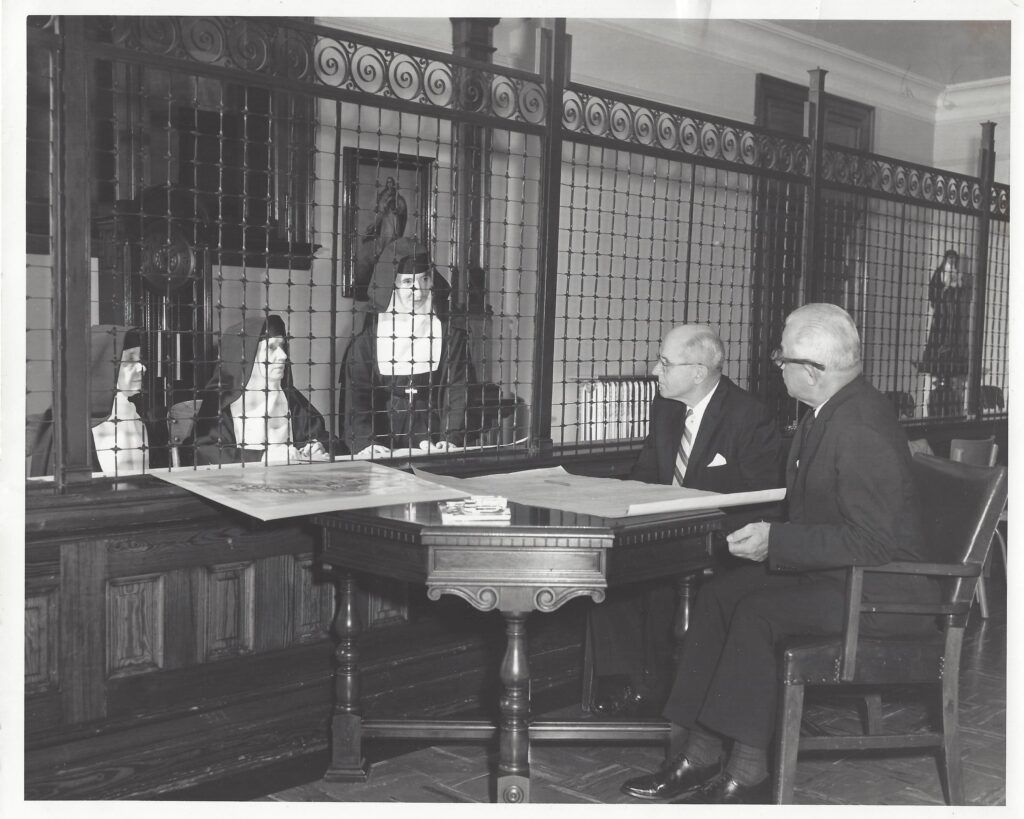On May 10, Saint Louis University hosted Sisters as City Builders: Archiving Global Histories in Local Perspectives, a public humanities program supported by a Missouri Humanities Award and co-sponsored by SLU’s Center for Research on Global Catholicism (CRGC). Organized by the St. Louis Catholic Archives Collective (SCAC), the event invited the community to explore the vital, yet often overlooked, contributions of Catholic sisters to the cultural, economic, and political landscapes of St. Louis and beyond.
The day’s goal was to bring these overlooked histories into public conversation and to show how anyone—students, scholars, or community members—can engage directly with archival collections to tell new stories. Programming included presentations on the history of Catholic sisters and archival research, a tour of the SCAC’s digital exhibits, a hands-on archives lab for participants’ own projects, and a scholar meet-and-greet reception.
In her opening talk, Dr. Anna Katharina Rudolph, Postdoctoral Research Fellow at the Center for Research on Global Catholicism, illustrated the theme of “city building” with the story of the Sisters of the Visitation, drawn from the memoirs of Sister Josephine Barber preserved in the St. Louis Visitation archives. When the sisters first arrived in Kaskaskia (just across the river from St. Louis) in 1833, they lacked even a proper convent or school. Undeterred, Sister Josephine recalled laying bricks with her own hands to finish the hearth of their first classroom, ensuring their young pupils would not freeze during Christmas lessons. From these humble beginnings, the sisters built an enduring educational presence in St. Louis.
That presence was tested during the Civil War, a period many do not immediately associate with Catholic nuns. In May 1861, as the Camp Jackson Affair brought violence to the city’s doorstep, families sought refuge at the sisters’ academy on Cass Ave. How does a convent prepare for war? As Sister Josephine recorded, by arming their walls with an arsenal of holy medals: prayers were their artillery, devotion their barricade. Remarkably, their school became a neutral haven. With daughters of both Union and Confederate leaders enrolled, the convent was spared from attack and instead grew to its largest enrollment to date.
A century later, the Visitation Sisters continued their city-building work in unexpected ways. Though it was still rare in the 1960s for women—let alone cloistered nuns—to participate in architectural planning, the sisters were directly involved in designing their new Academy on Ballas Road, consulting with the architects and contributing to the design. (See photos)
The program also featured Dr. Elodie Giraudier, recipient of the St. Louis Catholic Archives Visiting Research Grant funded by the CRGC. She shared her research process with the public, tracing how St. Louis archival collections connect the city to Cold War politics in Chile and beyond—underscoring the global reach of local Catholic archives.
Program Impacts
By the end of the day, participants left with both a deeper appreciation for the historical impact of Catholic sisters and practical tools for conducting their own archival research. As Dr. Mary Dunn, CRGC Director, explained, “By focusing on the global and local histories of women religious, we can begin to understand how their networks transcended geographical and social barriers. The archives that document their work give us a new lens on both Catholic history and the broader story of St. Louis.”
The program emphasized that archival research is accessible to everyone—not just professional historians.
Audience surveys confirmed the event’s strong impact:
- 75% said it had a major impact on how they understood St. Louis history in a broader context.
- 7% said it definitely sparked interest in learning more about the history of women missionaries in St. Louis.
- 5% felt much more confident exploring archives after the research lab, with another 27.3% “somewhat” more confident.
- 100% reported the program sparked strong interest in researching their own family or community history.
- Nearly all participants said they left with a new appreciation for St. Louis’s cultural heritage.
How to Learn More
A recording of the event, along with SCAC’s educational resources and digital exhibits is available at: https://stlouiscatholicarchivescollective.com/
The flagship exhibit, “Tracing Global Lives: Catholic Missionary Sisters and the Making of St. Louis,” explores the lived experiences of Catholic missionary sisters whose contributions to the city’s cultural heritage, political landscape, economics, and social welfare have shaped St. Louis into the complex site of cross-cultural interaction it is today.
“Sisters of Selma: Making the Fight for Civil Rights a Global Catholic Issue” showcases never-before-seen video, photographs, and interviews revealing how St. Louis sisters joined the Selma to Montgomery voting rights marches of 1965 and brought the civil rights struggle to the world stage.
A lighter but equally thought-provoking exhibit, “Nun Dolls: Connecting Sisters Globally Through Clothing,” explores nun doll collections held in St. Louis archives, uncovering how these curious objects reveal networks of global Catholic sisterhood.
What’s Next at the St. Louis Catholic Archives Collective
Upcoming Exhibits
The SCAC announced that three more digital exhibits will debut by May 2026:
- “Segregation, Desegregation, and Global Catholicism in St. Louis,” will examine how sisters both reinforced and dismantled structures of racial inequality.
- “Women Religious Missionaries from St. Louis to Latin America,” will highlight the international reach of local congregations into the Global South.
- “Global Catholicism in One Photo,” will present a microhistory uncovering the surprising connections between the Jesuits, Saint Louis University, President Teddy Roosevelt, the 1904 World’s Fair, and the Philippines in the aftermath of the Spanish-American War.
Research Funding
Applications are due September 15 for the St. Louis Catholic Archives Visiting Research Grant. Twice a year, the Center for Research on Global Catholicism awards up to $3000 to defray costs connected with conducting research at participating archives.
We welcome applications from academics of all ranks and disciplines, independent researchers, students 18 years and older, genealogists, and others.
Apply at: https://stlouiscatholicarchivescollective.com/research-funding-2/




